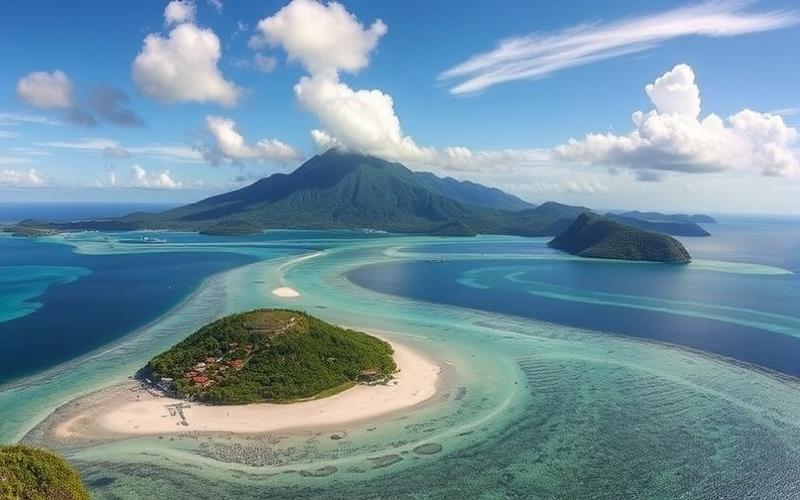
 Published on and written by Cyril Jarnias
Published on and written by Cyril Jarnias
Vanuatu, a tropical archipelago in the South Pacific, has become a prime destination in recent years for international entrepreneurs and investors seeking advantageous tax opportunities. With its business-friendly regulatory framework and attractive tax system, Vanuatu offers an environment conducive to the creation and development of offshore companies. In this article, we will explore in detail the benefits and procedures for setting up a company in Vanuatu, as well as practical considerations for successfully carrying out your entrepreneurial project in this lesser-known tax haven.
Discover our other articles on setting up a company in Vanuatu:


Vanuatu, a tropical archipelago in the South Pacific, is a developing country striving to reconcile its ancestral traditions with the [...]


Nestled in the heart of the Pacific Ocean, Vanuatu has built a reputation as a tax haven for businesses worldwide. [...]


Vanuatu, a tropical archipelago in the South Pacific, offers unique opportunities for businesses seeking skilled and motivated labor. However, the [...]


Nestled in the heart of the South Pacific, Vanuatu offers an idyllic setting and enticing economic prospects for entrepreneurs seeking [...]


Vanuatu, a tropical archipelago in the South Pacific, is much more than a paradise destination. It’s also a country experiencing [...]


Vanuatu, a South Pacific archipelago, has become a sought-after destination for international entrepreneurs seeking a favorable tax environment and flexible [...]


Vanuatu, a paradisiacal archipelago in the South Pacific, is increasingly attracting international entrepreneurs due to its favorable tax regime and [...]


Vanuatu, a tropical archipelago in the South Pacific, offers numerous opportunities for entrepreneurs looking to establish themselves in an idyllic [...]


Vanuatu, a tropical archipelago in the South Pacific, offers a unique environment for entrepreneurs and innovators. With its growing economy [...]


Understanding the consumer market in Vanuatu is essential for any business looking to establish or expand operations in this South [...]


Vanuatu, a tropical archipelago in the South Pacific, is positioning itself as an increasingly attractive destination for entrepreneurs seeking new [...]


Vanuatu, a South Pacific paradise archipelago, is attracting more and more international entrepreneurs thanks to its favorable tax environment and [...]


Vanuatu, a South Pacific island paradise, is attracting increasing foreign investment thanks to its favorable tax framework and business-friendly environment. [...]


In a world where innovation and entrepreneurship drive the global economy, Vanuatu is emerging as a surprising destination for startups [...]


Vanuatu, a picturesque South Pacific archipelago, is undergoing rapid digital transformation that is redefining its business landscape. As the nation [...]
Vanuatu’s Advantages for Business Establishment
Vanuatu offers numerous advantages that make it a preferred destination for offshore company formation:
Extremely favorable tax regime: Vanuatu stands out with the complete absence of income tax, corporate tax, capital gains tax, and inheritance tax. This zero-tax policy makes the country one of the world’s most attractive tax havens.
Flexible and business-friendly regulatory framework: Vanuatu’s legislation offers great flexibility for company formation and management, with simplified procedures and minimal financial reporting requirements.
Political and economic stability: Despite its small size, Vanuatu enjoys remarkable political stability and a growing economy, providing a safe environment for foreign investments.
Modern and confidential banking system: The country has a developed banking sector, offering quality financial services and a high level of confidentiality for international transactions.
Strategic location: Situated at the crossroads of Asia-Pacific, Vanuatu offers privileged access to the region’s emerging markets.
Good to know:
Vanuatu combines zero taxation with a favorable regulatory environment, making this small archipelago a prime destination for offshore company establishment.
Main Available Legal Structures
Vanuatu offers several types of legal structures adapted to foreign investors’ needs:
International Company (IC)
The International Company is the most popular legal form for offshore businesses in Vanuatu. It features the following characteristics:
- Complete tax exemption on profits earned outside Vanuatu
- High confidentiality: shareholder and director names are not made public
- Minimum required capital: 1 USD
- Possibility to have a single shareholder and a single director
- No requirement to maintain accounting records or file annual accounts
Limited Liability Company (LLC)
The Vanuatu LLC offers an interesting alternative, combining the advantages of corporations and partnerships:
- Limited liability for members
- Flexibility in management and profit distribution
- No minimum capital requirement
- Possibility to have a single member
Trust
Vanuatu also has favorable legislation for trust creation, offering:
- Effective asset protection
- High confidentiality
- Tax benefits for estate planning
Good to know:
The International Company remains the most sought-after structure in Vanuatu for its simplicity and tax advantages, but other options like the LLC or trust may be more suitable depending on your specific objectives.
Ultra-Competitive Corporate Taxation
Vanuatu’s tax regime is one of the most advantageous in the world for businesses. Here are the main aspects to remember:
Corporate tax: The corporate income tax rate is 0%, whether for locally or internationally generated income.
Value Added Tax (VAT): A 12.5% VAT applies to most goods and services, but offshore companies are generally not subject to it for their international activities.
Withholding tax: There is no withholding tax on dividends, interest, or royalties paid to non-residents.
Capital gains tax: Capital gains realized by companies are completely tax-exempt.
Customs duties: Customs duties apply to certain imports, but generally at low rates.
Tax treaties: Vanuatu has not signed any double taxation treaties, which can be an advantage for certain international tax optimization structures.
It’s important to note that despite this very favorable taxation, Vanuatu has committed to respecting international standards regarding tax transparency and anti-money laundering. Companies must therefore comply with certain reporting and due diligence obligations.
Good to know:
Vanuatu’s zero taxation makes it one of the world’s most attractive tax havens, but companies must nevertheless respect international financial transparency standards.
Setting Up Your Company in Vanuatu: Practical Guide
Setting up a company in Vanuatu is a relatively simple and quick process. Here are the main steps to follow:
1. Choose a Company Name
Start by checking the availability of your desired name with the Vanuatu Financial Services Commission (VFSC). The name must end with “Limited”, “Ltd.”, “Corporation”, “Corp.”, “Incorporated” or “Inc.”.
2. Prepare Incorporation Documents
You’ll need to draft the company’s articles of incorporation (Memorandum and Articles of Association). These documents define the company’s structure and operations.
Identify the company’s directors and shareholders. For an International Company, a single director and a single shareholder are sufficient, and they can be the same person.
4. Choose a Local Registered Agent
Vanuatu law requires every company to have a local registered agent. This agent will be responsible for communications with local authorities and the administrative management of the company.
5. Submit Registration Application
- Company registration application form
- Company articles of incorporation
- Information about directors and shareholders
- Proof of payment of registration fees
6. Obtain Certificate of Incorporation
Once your application is approved, the VFSC will issue a certificate of incorporation, marking the official birth of your company.
7. Open a Bank Account
After incorporation, you can open a bank account for your company, either with a local bank or an international bank.
The complete process generally takes between 1 and 2 weeks, depending on the complexity of your structure and the responsiveness of local authorities.
Good to know:
Setting up a company in Vanuatu is a quick and simplified process, but it’s recommended to use a local professional to ensure compliance with all legal requirements.
Vanuatu Compared to Other Offshore Jurisdictions
To better appreciate Vanuatu’s advantages, it’s interesting to compare it to other popular offshore jurisdictions:
Vanuatu vs Cayman Islands: – Taxation: Both offer zero taxation, but the Cayman Islands have a more established reputation. – Costs: Vanuatu is generally less expensive in terms of incorporation and maintenance fees. – Confidentiality: Vanuatu offers a higher level of confidentiality.
Vanuatu vs Belize: – Political stability: Vanuatu is considered more politically stable. – Banking services: Belize offers a wider choice of international banks. – Reputation: Vanuatu benefits from a better international reputation.
Vanuatu vs Seychelles: – Location: The Seychelles are closer to Europe and Africa, while Vanuatu is better positioned for Asia-Pacific. – Legal structures: The Seychelles offer a greater variety of business structures. – International treaties: The Seychelles have signed more international tax conventions.
Vanuatu stands out through its unique combination of advantageous taxation, political stability, and flexible regulatory framework, making it an attractive option for many international entrepreneurs and investors.
Good to know:
Although less known than some traditional tax havens, Vanuatu offers unique competitive advantages, particularly in terms of costs and confidentiality.
Social Obligations in Vanuatu: A Light Framework
Social obligations for businesses in Vanuatu are relatively light compared to many other countries, contributing to the country’s attractiveness for foreign investors. Here are the main points to know:
Social Security System
The Vanuatu National Provident Fund (VNPF) is the country’s main social security system. Employers are required to contribute to this fund for their local employees:
- Employer contribution: 4% of gross salary
- Employee contribution: 4% of gross salary (withheld at source by employer)
These contributions mainly cover retirement and certain basic benefits in case of illness or disability.
Health Insurance
There is no mandatory health insurance system in Vanuatu. Employers may choose to provide private health insurance to their employees, but it’s not a legal requirement.
Paid Leave
- 15 days of paid leave per year
- 21 days of paid sick leave per year
- Maternity leave (12 weeks) and paternity leave (5 days)
Working Hours
The standard work week is 44 hours, spread over 6 days. Overtime must be paid at a higher rate.
Minimum Wage
A minimum wage is in effect in Vanuatu, but it’s relatively low compared to international standards. It’s regularly reviewed by the government.
Termination
Termination procedures are relatively flexible, but termination benefits are due to employees with more than one year of service.
It’s important to note that these rules mainly apply to local employees. For expatriate employees or non-resident directors, conditions can be negotiated more freely within individual contracts.
Good to know:
Social obligations in Vanuatu are minimal compared to many developed countries, offering great flexibility to employers while ensuring basic protection for local employees.
Opening a Corporate Bank Account in Vanuatu: Step-by-Step Guide
Opening a corporate bank account is a crucial step after setting up your company in Vanuatu. Here’s the procedure to follow:
1. Choose a Bank
- National Bank of Vanuatu
- ANZ Bank
- Bank South Pacific (BSP)
2. Prepare Required Documents
- Your company’s certificate of incorporation
- Company articles of incorporation
- Proof of identity and residence for all directors and significant shareholders
- A business plan detailing the company’s planned activities
- Proof of funds origin
3. Complete Application Form
Each bank has its own account opening application form. You’ll need to provide detailed information about your company and its activities.
4. Bank Interview
Many banks require an in-person or video conference interview to discuss your application and verify your identity.
5. Background Check
The bank will conduct thorough checks on your company and its directors as part of its anti-money laundering procedures.
6. Initial Deposit
Once your application is approved, you’ll need to make an initial deposit. The minimum amount varies by bank but can range from 500 to 10,000 USD.
7. Account Activation
After receiving the initial deposit, the bank will activate your account and provide you with necessary access information.
It’s important to note that the account opening process can take several weeks, or even months, due to the strict due diligence procedures implemented by banks.
Good to know:
Although the bank account opening process in Vanuatu may seem complex, it’s designed to ensure the integrity of the country’s financial system. Thorough preparation and complete transparency are essential to successfully complete this step.
Promising Business Sectors in Vanuatu
Although Vanuatu is primarily known for its tax advantages, several business sectors offer interesting opportunities for foreign investors:
Offshore Financial Services
- Wealth management
- Trust services
- Captive insurance
- Online trading
Tourism and Hospitality
- Hotel complex development
- Ecotourism
- Cruise services
Agriculture and Fishing
- Production and export of organic products
- Aquaculture
- Seafood processing
Renewable Energy
- Solar energy
- Geothermal energy
- Biomass
Information and Communication Technology (ICT)
- Software development
- Call center services
- Online payment solutions
Real Estate
- Luxury property development
- Rental investment
- Sustainable development projects
These sectors often benefit from specific government incentives and a regulatory framework favorable to foreign investments.
Good to know:
Although offshore financial services remain predominant, Vanuatu offers diverse opportunities in growing sectors, supported by government policies favorable to foreign investments.
Recruiting Staff in Vanuatu: Keys to Success
Recruiting qualified staff is a crucial aspect for your company’s success in Vanuatu. Here are some essential points to consider:
Local Labor Market
Vanuatu has a young and growing workforce, but qualification levels can vary significantly across sectors. Areas such as tourism, agriculture, and basic services generally have a good pool of local talent.
Expatriate Recruitment
For highly skilled or specialized positions, it’s often necessary to recruit expatriates. The Vanuatu government encourages local employment but is generally open to granting work permits for positions that cannot be filled locally.
Recruitment Process
- Advertisements in local media and online job sites
- Collaboration with specialized recruitment agencies
- Networking within the local business community
- Participation in job fairs organized by local educational institutions
Work Permits
- Justification of the need to hire a foreign worker
- Proof of candidate’s qualifications and experience
- A training plan for skills transfer to local employees
Training and Development
- Improve your team’s skills
- Promote talent retention
- Meet government requirements for local workforce development
Corporate Culture
- Flexibility for family and community obligations
- Integration of elements of Vanuatu culture in the work environment
- Promotion of diversity and inclusion
Good to know:
Recruitment in Vanuatu often requires a mix of local and expatriate talent. A balanced approach, respectful of local requirements while maintaining international standards, is key to success.
In conclusion, Vanuatu offers an extremely favorable environment for the creation and development of offshore companies, combining advantageous taxation, a flexible regulatory framework, and opportunities in various sectors. However, as with any internationalization project, it’s crucial to prepare well and surround yourself with experienced professionals to effectively navigate this new business environment.
Disclaimer: The information provided on this website is for informational purposes only and does not constitute financial, legal, or professional advice. We encourage you to consult qualified experts before making any investment, real estate, or expatriation decisions. Although we strive to maintain up-to-date and accurate information, we do not guarantee the completeness, accuracy, or timeliness of the proposed content. As investment and expatriation involve risks, we disclaim any liability for potential losses or damages arising from the use of this site. Your use of this site confirms your acceptance of these terms and your understanding of the associated risks.



